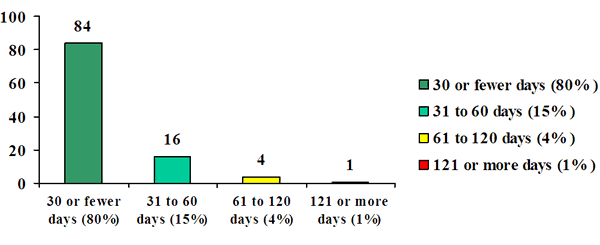Annual Report on the Access to Information Act for the period ending March 31, 2012
3. Statistical Report on the Administration of the Access to Information Act
This section provides information about the processing of requests under the Access to Information Act. New statistical reporting requirements put in place by Treasury Board in fiscal 2011–2012 are reflected in the attached detailed report (see Appendix II).
3.1 Number and Origin of Requests
Elections Canada received 136 new formal requests for information under the Access to Information Act during the period April 1, 2011, to March 31, 2012. In addition, two requests had not been fully processed during the previous reporting period. Therefore, a total of 138 formal requests required action.
By the end of the fiscal year, the ATIP Office had completed 105 requests, leaving 33 requests outstanding, most of which had been received less than 30 days before the end of the fiscal year. The total number of requests received represents a 74 percent increase from the previous reporting period. This increase is in part a result of interest in investigations sparked by the 2011 general election.
Number of Requests Received
Most requests were from business/private sector (61), followed by the media (44), organizations (24) and the public (7).
3.2 Disposition of Completed Requests
Of the 105 requests completed during the reporting period, 28 resulted in full disclosure and 45 resulted in partial disclosure of the information requested. Seven requests related to records that were totally exempted or excluded. The ATIP Office was unable to process 24 requests – either because the information requested did not exist or because there was insufficient information to locate the records. One request was abandoned by the applicant.
Number of Requests Completed
3.3 Exemptions to the Release of Information
The attached statistical report (Appendix II) includes the number of requests for which Elections Canada invoked specific types of exemptions and provides details on these exemptions. If an exemption is invoked several times in the same request, it is reported only once.
The two most common exemptions applied were those under subsection 19(1) and section 16.3 of the Access to Information Act. For 36 requests, Elections Canada invoked subsection 19(1) of the Act to protect personal information. For 11 requests, Elections Canada invoked section 16.3 of the Act. This exemption is specific to information obtained or created in the course of investigations, examinations or reviews conducted under the authority of the Canada Elections Act.
3.4 Completion Time
A total of 84 requests (80 percent) were completed within 30 days, 16 requests (15 percent) within 31 to 60 days, 4 requests (4 percent) within 61 to 120 days and 1 request (1 percent) in more than 120 days.
Completion Time of Requests
The longer process times are a result of the larger volume of requests received during this fiscal year.
3.5 Extension of the Time Limit
Section 9 of the Access to Information Act provides for the extension of the statutory time limits if consultations are necessary or if a request is for a large volume of records and processing the request within the original time limit would unreasonably interfere with the operations of the institution. Elections Canada took 10 extensions during the reporting period.
It is the practice of the ATIP Office to provide partial preliminary release of records before the extended due date whenever possible.
3.6 Consultations
The ATIP Office responded to six formal consultations from other government institutions during the period covered by this report.
3.7 Fees and Costs
The ATIP Office collected application fees of $675 during the fiscal year. The budget for salaries of the employees assigned to the administration of the Access to Information Act totalled $118,410, while the budget for operating and maintenance costs (including consultant services) came to $100,445.
3.8 Complaints and Judicial Review
One complaint originating from a request closed in fiscal 2010–2011 was resolved in this fiscal year. In this instance, the individual complained that Elections Canada had inappropriately applied subsection 19(1) of the Access to Information Act to personal information to which he believed he was entitled. The Office of the Information Commissioner of Canada (OIC) investigated the complaint and determined that Elections Canada had applied the exemption correctly. The applicant has since applied to the Federal Court for a judicial review of his complaint.
A second complaint concerning the application of subsection 19(1) is currently under investigation by the OIC.
A third complaint concerned a request for "The entire Contributions and Expenses Database, to include the financial reports for Candidate's Electoral Campaign Return, Contestant's Leadership Campaign Return, Contestant's Nomination Campaign Return, Registered Association Financial Transactions Return and Registered Party Financial Transactions Return (yearly and quarterly), for all available years. Include all available information, including postal codes, provinces, cities, etc.…"
Elections Canada advised the applicant that political contributions and expenses reported to it are published in accordance with the Canada Elections Act. Since this information is available on the Elections Canada website, it is excluded under paragraph 68(a) of the Access to Information Act. To assist the applicant in retrieving this information, Elections Canada provided written instructions on how to download it. The complaint is currently under investigation by the OIC.



